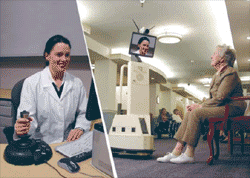
I flat out missed St. Patrick's Day. Not that I care. But it's kinda bizarre—a whole holiday went by and I didn't even know. Not that I ever understood that one. Me, I don't like green beer and the one and only time I had a "shamrock" shake I barfed. I remember it quite vividly because Mickey D's was pushing it like crack; I think I musta been about 7 or 8, and I begged for one 'cause the commercials made it look so damn good. I wanted it so bad, then I ended up puking in the back of the station wagon. Since then there's no love lost between me and St. Nick. Oh, that's the other guy, and I really have a beef with him. But I'll save that until xmas in July. Can't say I'd stay in a room with Ronald McDonald either.
I almost missed another one. Today was the Ides of March. Now what the hell is that, you may be wondering. I had to look it up myself but Hijink, who should really just get a blog of her own insisted I say something about it, particularly given the political climate. (Have you been following the ballyhoo about the
draft among other things?) I'm gonna do a hatchet job, but basically every month in the old Roman calender had a day called the Ides. It was either the 13th or the 15th of the month, depending on the month (the 15th day in March, May, July, and October; the 13th in the other months) , but you don't usually hear the expression the Ides of November or June. The expression "Ides of March" gets bandied around though thanks to
Shakespeare's ode to political assassination. "Beware the ides of March" is uttered by a gibberish man in
Julius Caesar (I, ii, 33).
A Soothsayer emerges from the crowd and speaks this prophecy to Julius Caesar, who asks him to come closer and repeat what he has just said. He studies the man's face, listens to the warning again, but decides, "He is a dreamer; let us leave him." There is irony here, because the audience knows (from history) that Caesar will be killed on the ides (the 15th) of March, and that he is exercising poor judgement in dismissing this prophecy. Later, when he meets the Soothsayer again on the way to the Senate, he confidently says to him, "The ides of March have come." But the Soothsayer reminds him, "Ay, Caesar, but not gone." There will be other warnings to Caesar from different people, which he will ignore, and go off to meet his death.
By all accounts Caesar was a smart guy, so wha' happen, mon? Well one theory, aside from the fact that he didn't buy the warning at all is that he actually did heed—but he mixed up the dates. Like me, he may have been averse to important dates and thought that the Ides of March was on the 13th, been wrong, and paid for it with his life. Do you think St. Pat's gonna come and get me? Is there anything I could do to ward off his wrath? How 'bout green eggs and ham? I trust Dr. Seuss more than any of these guys, you know what I'm sayin'? What I'm sayin' is learn your history and your dates. Don't be like me; make something of yourself.
Like Theodor Geisel aka Dr. Seuss. He was a pretty shnifty (shifty + nifty) guy. Besides his dietary recommendations, he was a political cartoonist for a coupla years during the Great War. Dr. Suess Goes to War is worth checking out, but only after you've read all the other forgotten classics. Everybody knows The Cat in the Hat, but until you've read Marvin K. Mooney Will You Please Go Now!, The 500 Hats of Bartholomew Cubbins, and some of his other less known works, you don't know your Seuss. Which is plain wrong.
Oh, now I'm on the phone with Nappy who is insisting that St. Paddy's day has yet to come. Guess what? I don't care.
What's affecting me more than either of the aforementioned days are Mecury Retrograde, Tax Time, and Mosquitos, listed here in reverse order of peskiness.
3. Mercury Retrograde. Don't scoff. Mercury is the ruler of communication. Three or four times a year Mercury appears to travel in reverse. What actually happens is that it slows relative to its actual average speed. It's sort of like when you were a kid laying down in the back of the station wagon and sometimes the traffic in the next lane looked like it was going backwards rather than you going forward but really it was an optical illusion. All the planets have retrograde periods but the one you most need to know about is Mercury 'cause of what it's all about. Pop quiz: what's it all about? COMMUNICATION.
When Mercury goes into retrograde things can go afoul: the check is in the mail is meant literally. Computers crash. The tiny print should actually be read. Phone networks can get tied up. Accidents happen—not necessarily fatal ones but little things like red wine spilling on your brand new white shirt. Warnings, like the Ides of March, should be taken seriously. Some of you skeptics will ask aren't these things always the case? Of course, but the likelihood is greater during Mercury Retrograde.
It's true. Six has had not one but two Macs fry—not crash—but actually fry with smoke coming out of them during Mercury Retrogrades. I remember one last year when I tried to make an urgent phone call from my cell phone, and the circuits were busy for hours. At one point my phone rang and it was a friend who was convinced she'd dialed someone else's number. She said she'd been having trouble with the phones all night. When I was finally able to place my call the voicemail message didn't make it to the recipient for two days.
During Mercury Retrograde you don't wanna do irrevocable things like sign contracts, make big purchases, DO YOUR TAXES, etc. because you might screw up. But Mercury Retrograde shouldn't be about fear so much as it's just a reminder—a long ass, three-week reminder—to dot your i's and cross your t's, to make careful, well planned decisions, and to keep your eyes open. It's like a full moon in a way. Crazy shit is more likely to happen during a full moon. So to with Mercury Retrograde. Postpone what you can, research or make plans for the things you can do later, save your shekels and buy stuff afterward, etc.
The degree to which you, as an individual, will be affected depends on which sign the retrograde is passing through. This time around it's Aries, lucky you! And Libra (being the opposite sign). If you're really interested in the whyfores and wherefores, see
Mercury Retrograde: Strap in for Upheaval! Great title ain't it. Be sure to check out the poem at the end of the page; it's hilarious but true. And quite Seussian, speaking of which. No wait, I'll put it here 'cause I know you want me to:
MERCURY RETROGRADE
by Linda Anderson Copyright 2000 Linda Anderson All Rights Reserved
When the telephone rings, but nobody's there,
It's Mercury Retrograde in the air!
When you're stuck at the airport, your flight's been delayed,
You're waiting with Mercury Retrograde!
When you can't communicate, everyone's in a trance,
That's Mercury Retrograde doing its dance!
When you can't get on-line to talk or to trade,
You're dealing with Mercury Retrograde!
When the folks you work with can't get along,
That's Mercury Retrograde singing its song!
When the TV's on and the screen starts to fade,
Just remember it's Mercury Retrograde!
But, when you're late for a meeting, you don't need to fret,
With Mercury Retrograde, no one's there yet!
When the mail doesn't come, there's no bills to be paid,
Shout hooray for Mercury Retrograde!
When the car keys get lost, you can't go anywhere,
Just stay home and read in your plush easy chair.
Eat lots of cookies, and drink lemonade,
And toast your friend Mercury Retrograde!
There's no point in striving to keep up the pace
When Mercury Retrograde gets in the race.
Take time to relax, and your nerves won't be frayed
These three weeks when Mercury goes Retrograde!
2. Tax Time. Enough said. If you haven't done 'em by the 19th, when Mercury goes (Pop quiz: Answer: RETROGRADE), then you might want to wait 'til it's over. 'Cept it isn't over until April 12, which is pushing it. By the way, did you know you can file online for free this year?
Details at Irs.gov.
1. Mosquitos. SF is ripe with them this year, and I'm gettin' ready to declare war. Tonight I was embroiled in battle as soon as I got home. Just me and a loner but a tenacious one. I've been going at it with the nearest thing I could grab, which turned out to be an empty pillowcase. My shots have been off, but after the third time I told it "I may have missed again, but now you know I'm serious. I will kill you before I go to bed." I got out my
bug vac and have been holding it like a homesteader defending her hearth, but that was hours ago and my chin keeps dropping down to my chest. It's currently 3:29 a.m. I might have to concede defeat. Is it Wednesday now?

 brought us the prostate surgery performing robots—not quite as many served as McDonalds but well on the way, I'm sure. The mechanical aides have even been a hit with patients, many of whom apparently prefer intacting with them than with their human counterparts. Given some of the robot-like interactions I've had with doctors over the years, I don't doubt it. Who can tell the difference sometimes? Inquiring minds click here.
brought us the prostate surgery performing robots—not quite as many served as McDonalds but well on the way, I'm sure. The mechanical aides have even been a hit with patients, many of whom apparently prefer intacting with them than with their human counterparts. Given some of the robot-like interactions I've had with doctors over the years, I don't doubt it. Who can tell the difference sometimes? Inquiring minds click here.
















